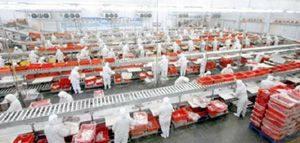Hogging the Market
2013-04-29byZiMo
by Zi Mo
Few could have expected that the largest-ever acquisition of a U.S. company by a Chinese firm would occur not in sectors of telecommunications, high-tech, or petroleum, but of all things, pork.
Chinas largest meat processor, Shuanghui International Holdings Limited, recently reached a $7.1 billion purchase deal with Smithfield Foods Inc., Americas largest pork producer. On September 6, the two companies announced that the U.S. Committee on Foreign Investment had approved the proposal, clearing the way for Shuanghuis acquisition of Smithfield Foods. Smithfield shareholders were scheduled to vote on the transaction on September 24. Some analysts believe the acquisition will be completely wrapped up within a few months.
Win-Win
Will the merger benefit both sides? Many industry insiders assert that each company will complement the other after the acquisition. Enterprises under Shuanghui International Holdings will likely adopt Smithfields advanced safety control technology, as well as its upstream resources in the U.S. market, which are pressing needs for Shuanghui. On the other side, shareholders of Smithfield will receive a 31 percent premium on the companys closing share price of $25.97 on May 28, under terms of the deal announced the day before. Furthermore, Smithfield will obtain tremendous market opportunities from Chinas increasing demand for high-end pork.
According to the U.S. Department of Agriculture, the countrys pork market has been shrinking for four successive years. Accordingly, Smithfields profits have seen a dip in recent years, with losses of $250 million and $100 million in the 2009 and 2010 fiscal years, respectively, while pork consumption in China continues steadily increasing. Each year Chinese people consume more than 50 million tons of pork, making the country the worlds largest pork market. Currently, China contributes half of the worlds pork consumption, and its pork market is already double that of the United States.
Despite its dominant position in Chinas meat market, Shuanghui still lags far behind the cutting edge of the processed meat industry. At present, Shuanghui Group operates seven pig farms, with a combined annual output of 330,000 pigs, but that falls far short of its domestic demand, which sits at more than 10 million.
In addition to enhancing supply lines, the Shuanghui-Smithfield transaction will also enable the Chinese enterprise to learn advanced management from the U.S. pork company. “Smithfield takes pride in its world-leading food safety system, unrivaled supply chain capacity, and world-class biological safety system and scientific monitoring,” declares Wan Long, chairman of Shuanghui Group. “Moreover, its advanced product tracking capacity enables the company to track product information from pig farms to dinner tables. Smithfield pork is considered the safest in the United States.”
In 2011, Shuanghui was severely affected by a steroid-tainted pork scandal. Today, food safety remains a pressing concern in China. The acquisition of Smithfield is expected to help Shuanghui improve its overall product quality. Zheng Jinqiao, chairman of Richlink International Capital Co., Ltd., comments that the most valuable piece of the acquisition is consumer confidence, which for Shuanghui, is“more valuable than gold.” If the deal goes through, Shuanghui will become the worlds biggest pork producer and supplier. “Shuanghui International and Smithfield will complement each other optimally and both expand globally,”Wan Long asserts.
Behind the Curtain
Although the Shuanghui-Smithfield transaction isnt yet complete, it has already been deemed a turning point for the Chinese food industrys overseas expansion. Due to their better reputations in terms of quality control, Western companies and brands will benefit from Chinese consumers increasing demand for safer products. The Chinese food industry celebrated U.S. approval of the transaction. Market analysts conclude that three reasons lie behind the approval: First, the United States needs foreign investment to boost its economic growth and employment rate. Currently, the U.S. economy is still recovering slowly, and its unemployment rate has continued hovering as high as 7.3 percent despite recent improvements. Second, agriculture isnt a sensitive sector. Rejection of such a deal would shy other potential foreign investors away from the U.S. market. Finally, Shuanghui promised to keep all of Smithfields management and employees, which won the firm support from the labor union and local governments.
Statistics reveal that Chinese enterprises invested a total of US$6.5 billion in the United States in 2012, but that is a tiny fraction of annual total foreign investment in the United States, which exceeds $250 billion. Thilo Hahnemann, a researcher at the U.S. consulting firm Rhodium Group, notes that China has become the worlds second largest economy and will probably pass the United States in the future. Now is the early stage of Chinese enterprises investing abroad, and he estimates that more Chinese investment will swarm the U.S. market in the near future.
According to Ma Wenfeng, an analyst with Chinas leading agriculture consulting firm CnAgri, if the acquisition is completed, Shuanghui will have the chance to form a comprehensive industrial chain linking hog production, meat processing, and marketing. In the future, Chinas food industry will probably see greater numbers of acquisitions and mergers. Perhaps the Shuanghui-Smithfield deal represents only the first rays of dawn.
